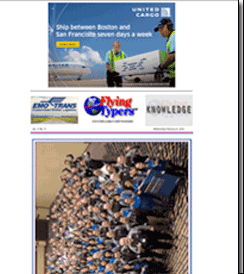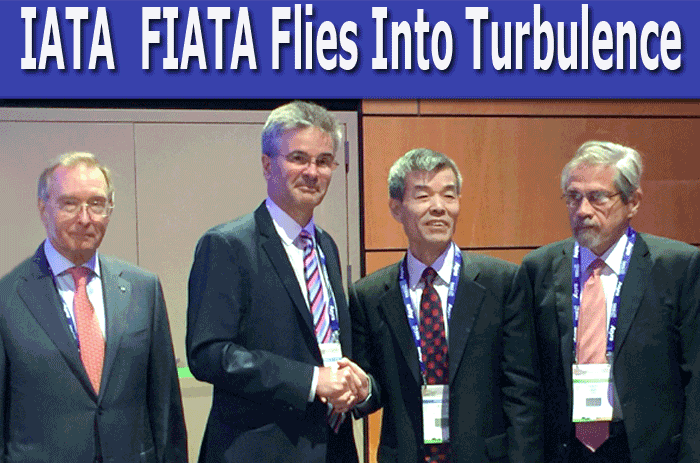
Signing the historic IATA FIATA accord at
the FIATA World Congress in Dublin on October 7, 2016, from left to
right—Jean-Claude Delen, FIATA; Aleks Popovich, IATA; Zhao Huxiang,
FIATA and Rodolfo Sagel, FIATA. |
The anticipated cooperative IATA/FIATA Air Cargo
Program (IFACP) announced amidst hope and glamour at FIATA’s World
Congress in Dublin 2016 has apparently hit some turbulence in its takeoff
pilot program in Canada.
What Happened?
Despite all hope and promise, the pilot program
seems stuck in a holding pattern.
Sometimes the expected and unexpected thwart
the best laid plans of mice and men.
In Canada, IATA and FIATA imagined that a small
sample market made up of roughly 250 members of the Canadian International
Freight Forwarders Association (CIFFA) would provide some traction to
the new partnership, both by being large enough to provide a working template
and also small enough to skip the downside push-pull associated with bigger
markets elsewhere.
In mid-September the 100+ IATA Agents in Canada
were notified in a joint letter from IATA and CIFFA of the implementation
of the IFACP, and the requirement to sign the new IFACP Forwarders Agreement.
Well, guess what? The pilot implementation actually
produced the kind of positive results hoped for, with 80+ forwarders signed
up, and more importantly industry feedback! Both IATA and FIATA were impressed
with the comments emanating from forwarders, constructive criticism so
vital to ensuring the IFACP’s design was ready for global roll out.
Forwarders given the opportunity, let it be known that while they had
great hope for the new paradigm, some tweaks were needed. Issues were
highlighted of a technical nature and a forwarder’s legal working
group established to suggest amendments to the program’s Forwarder
Agreement and Handbook, all to better reflect the nature of today’s
carrier-forwarder relationship.
Ironing Out
Issues
It is now in the hands of the program’s
governing board to iron these issues out, and next week the IATA FIATA
Governance Board (IFGB) will meet in Dallas to consider the various revisions.
So stay tuned for upcoming issues, as FlyingTypers
tracks whether IFGB has smoothed out the bumps in the runway, to allow
the IFACP to take off.
Some Background
When the groundbreaking IFACP agreement was announced
nearly two years ago, IATA FIATA said that the objective was “to
review, refine, and re-engineer the airline forwarder relationship into
one which would be managed jointly by airlines and forwarders.
“Major steps have been made and this collaboration
has resulted in a joint IATA-FIATA Air Cargo Program, and significant
strides in redefining airline and forwarder responsibilities,” the
happy couple proclaimed in 2016.
Can IATA
FIATA Move The Marble?
During the last few months, issues emanating
from the Canadian pilot have been reviewed, discussed and refined to a
submission now on the agenda of the aforementioned IATA-FIATA Governance
Board meetings in Dallas March 8, ahead of IATA’s World Cargo Symposium,
which debuts March 12.
As mentioned the IFACP objective is “to
review, refine, and re-engineer the airline forwarder relationship.”
Neither the program’s Agreement nor its Handbook are chiseled in
stone; the IFGB has been delegated the authority and responsibility to
amend these documents as required, so that they remain relevant to a very
dynamic and evolving air cargo industry. Thus, there are positive expectations
that under the umbrella of the IFBG, forwarders and airline delegates
will demonstrate their commitment to the IFACP and its objectives, and
bring a better future to the air cargo partnership, and a higher level
of professionalism and service to the international traders served.
The
Promise of Dublin
After all, the freight forwarder is the airline’s
natural and biggest single customer.
Time to break the mold, make some changes including
positions, fulfill the promise of Dublin, and get to business we say.
IATA FIATA
Accord At Start Up
“We are working with a common vision for
industry collaboration and that is a break from the past,” said
Aleks Popovich, IATA’s Senior VP Financial & Distribution Services,
on October 7, 2016.
“This new agreement,” said FIATA
President Zhao Huxiang, “gives the air cargo industry the opportunity
to continue to be progressive and successful.”
Just like everything else, the launch of a landmark
cooperation between IATA and FIATA has included no small measure of great
expectations.
Delivered
Keynote
When I spoke in Dublin in 2016 to accept my FIATA
Fellowship, it was to a packed room of about 400 people. Sitting just
below the stage were FIATA President Zhao Huxiang, FIATA’s Jean-Claude
Delen, who is credited as the architect of the IATA FIATA agreement, Glyn
Hughes, IATA and some others including the aforementioned Aleks Popovich.
I had wondered then what a media guy could say
to these people that might help the process along.
As it turned out, memories of delivering my newspapers
around U.S. cargo areas in USA in the 1970s, first as The Cargo Paper
and then starting in 1975 as Air Cargo News, formed the foundation for
what I had to say.
I learned about air cargo by spending one week
a month in New York, Philadelphia, Atlanta, Miami, Los Angeles, San Francisco,
and Chicago between 1970 and 1995.
In addition to our mailing list, I would hand
deliver our paper, college campus-style, to the airline and forwarder
groups.
Help From
Rodney Dangerfield
So as keynote at an historic accord, I thought
I would channel the great comedian Rodney Dangerfield, who had a comedy
gag line after every incident in his routine when he said:
“I tell you, I get no respect.”
I learned immediately from my first-hand experience
in and out of a thousand brokers and forwarder offices all over the U.S.
every month for 25 years that forwarders, unlike their more glamorous
airline brothers, get no respect.
So I went with that theme to set my remarks in
motion.
You can read the speech below.
The hope is that IATA and FIATA will get beyond
the talking stage and with mutual respect for each other and the good
of air cargo, forge real change.
All of us need some good news out of Dallas this
coming week.
Geoffrey
|
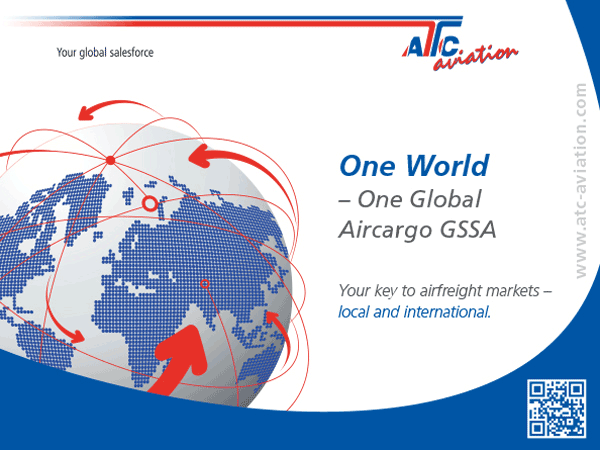



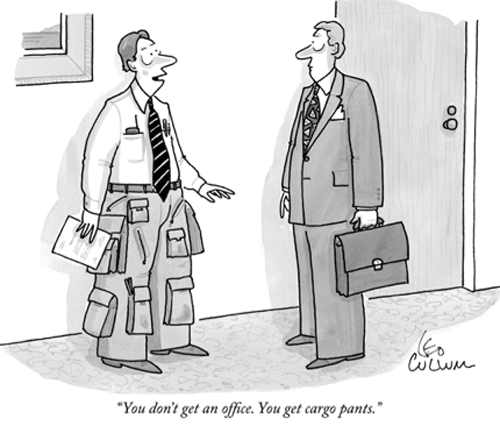

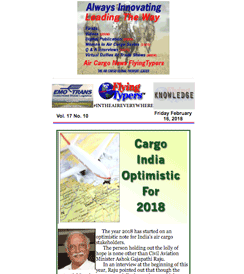 Vol.
17 No. 10
Vol.
17 No. 10